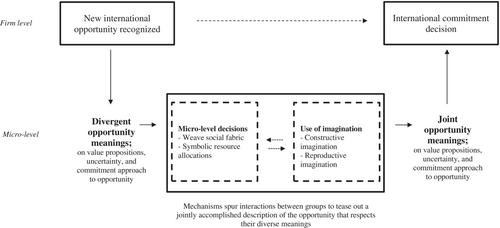Despite a vast body of theory on internationalization processes, little is known about the microfoundations of how firms deal with internal groups' diverse views when trying to make international commitment decisions. Drawing on the concept of opportunity formation and a detailed case study, we develop a model that shows how, under the condition of diverse internal meanings, firms can make an international commitment decision by creating “joint opportunity meanings.” We show how imagination plays an essential role in achieving this decision. Our study contributes to global strategy in multiple ways, including detailing some microfoundations of internationalization process theory, assessing group-level dynamics in global strategy decision-making, and advancing insights into the relationship between opportunity formation and imagination.
This paper explains how global organizations can reach a decision to commit to an opportunity in a foreign market in a situation characterized by disagreement among internal groups. We found how it was critical to move from diverse views on an opportunity to joint opportunity meanings, whereby the groups mutually accomplish a description of the opportunity with an agreed and common terminology that is ambiguous enough to accommodate remaining diversity in views. In this process, managers' forward-looking imaginations, in combination with socialization and symbolic actions, were crucial. Our paper highlights how local ideas in complex multinationals can be spread with the intent to reach key decision-makers and how firms can reach sufficiently overlapping meanings that enable them to strategically move forward while allowing for the plurality of views that multinationals often exhibit.



